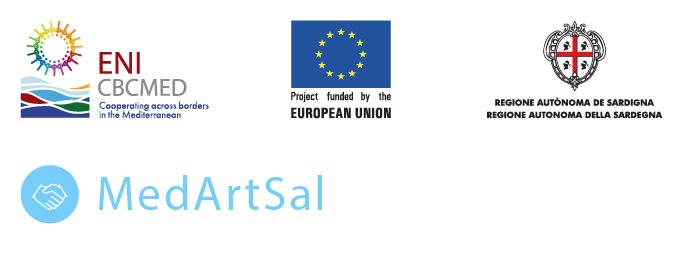MedArtSal Project
The European project MedArtSal entitled « Model of sustainable management of Mediterranean artisanal salt » officially started on 06 November 2019 and will continue until 05 November 2022. This project is funded by the European program ENI CBC Med 2014-2020 , with a total budget of 3,2 million euros and a European contribution of 2,9 million Euros (90% of the total budget).

SAIDA S.A is one of the partners benefiting from this project, will target the methodologies and approaches of sustainable salt management as well as the creation of new products and services in the framework of a cooperation involving six other partners from the Mediterranean countries (Spain, Italy, Lebanon and Tunisia)
About the project:
The MedArtSal project aims to promote the sustainable development of artisanal salt works by providing real economic and environmental support. Nowadays, the Mediterranean salt works are facing many pressures due to the change of social values, which forces them to develop innovative strategies to ensure their continuity. Faced with this common challenge, four Mediterranean countries(Spain, Italy, Lebanon and Tunisia) have mobilized to promote the development and rehabilitation of artisanal salt mines in order to stimulate the local economy and territorial cohesion thanks to the diversification of the markets. Taking into account the valuation of biodiversity. The MedArtSal project is an innovative action that supports this initiative aimed at developing coordinated actions and defining a sustainable and adaptable management model for artisanal saltworks. This model includes a strategic marketing plan, a guide to sustainable techniques for new products and services, and a strategy for valuing biodiversity. Such cooperation should have a significant impact on the artisanal saltworks targeted by this MedArtSal project for concrete economic development. As a result, this MedArtSal project aims to engage the cooperation of several actors and communities, composed of salt workers, SMEs, economic operators, politicians and civil society
Goals :
- Identify those areas susceptible to economic and environmental challenges for the geographical distribution, socio-economic value and biodiversity significance.
- Define sustainable solutions, promoting management policies or procedures throughout the determination of critical elements for salinas development.
- Develop and test tailored management solutions in several case studies and pilot actions
- Foster collaborations on B2C (resident and tourists) and B2B (GDO and HO.RE.CA) markets, promoting a SME cluster per participating country
- Build network among local producers and businesses to develop public-private cooperation
partners :
- CUEIM – University Consortium for Industrial and Managerial Economics (Italy)
- Mediterranean Sea and Coast Foundation (Italy)
- Association for the Development of Rural Capacities (Lebanon)
- IUCN Centre for Mediterranean Cooperation (Spain)
- University of Cádiz (Spain)
- Tuniso-Italian Chamber of Commerce and Industry (Tunisia)
- Fair Trade Lebanon (Lebanon)
- Saida Society (Tunisia)
Associated partners:
- Assocamerestero – Association of Italian Chambers of Commerce Abroad (Italy)
- Ente di Gestione per i Parchi e la Biodiversità-Delta del Po (Italy)
- Municipality of Anfeh (Lebanon)
- Consejería de Agricultura, Ganadería Pesca y Desarrollo Sostenible (Spain)
- SALARTE Fund for the Stewardship and Recovery of the Salt Marsh (Spain)
- The Mediterranean Wetland Initiative (MedWet) (France)
Project Manager: Belaîd SOUID
Email: souid@topnet.tn
Tel: +216 98 407272

